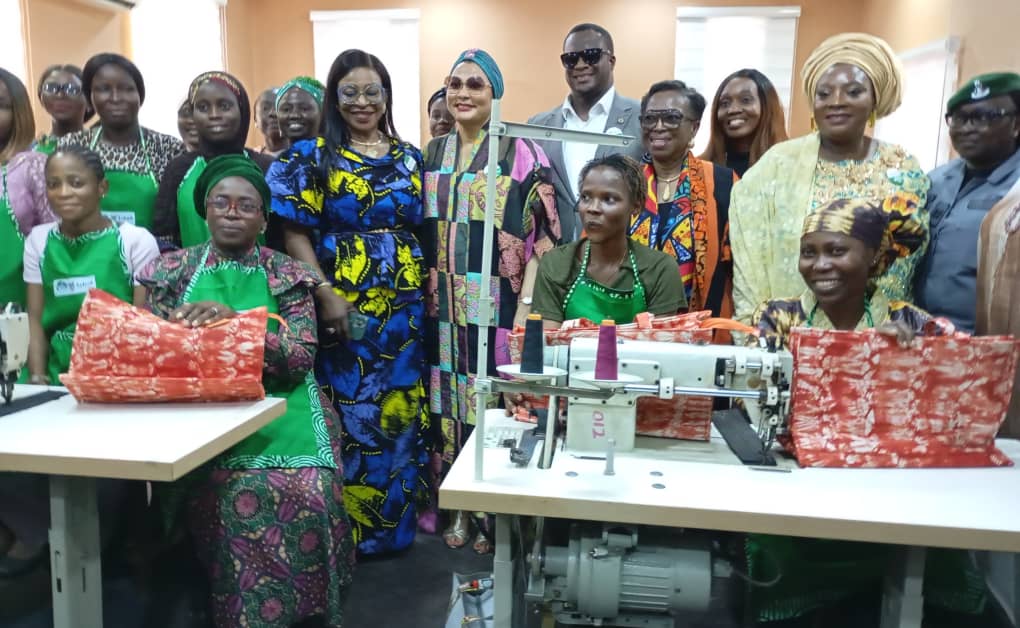The Nigeria Export Promotion Council (NEPC) has disclosed that about 12,665 women, youth and less privileged have benefited from empowerment programmes under its Micro-Small Medium-Sized Enterprise (MSME) clinics.
Its Executive Director, Mrs Nonye Ayeni, who made the disclosure while appraising the Non-Oil Export Performance for the year 2024, in Abuja on Friday – yesterday, January 31 – said that over 587 women-led businesses also benefited from capacity-building and women in export programmes across the six geopolitical regions in the country.
“Other programmes are export inclusiveness to audit/needs and participation in Small and Medium-sized Enterprises (SME) trade exhibitions, among other things.
“Total of 12,665 women, youth, and persons with special needs have been empowered through Micro-Small Medium-Sized Enterprise (MSME) clinics.
“They were also empowered through the support of Women in Export programmes and Youth for Export Development Programmes (YEXDEP),” she said.
This is even as the council also disclosed that its non-oil export performance in 2024 amounted to over $5bn revenue.
Mrs. Nonye Ayeni, the council executive director made this disclosure also made the disclosure while appraising the Non-Oil Export Performance for the year 2024, in Abuja yesterday.
According to her, the effort and commitment in achieving the goal was through effective collaboration with other relevant agencies.
Ayeni said that the council, as the secretariat of the implementation committee for Export Expansion Grant (EEG) , facilitated the submission of EEG baseline data for 2022/2023.
She said that 188 exporters had successfully submitted their baseline data on the web portal, while efforts were ongoing for processing EEG rates accruable to beneficiaries.
The NEPC boss noted that a total of 4,824 new exporters were registered online in 2023, compared to 3,715 exporters for the preceding year.
“While active exporters grew by 21.4 per cent in 2023 to 12, 325 in 2024, showing improved export readiness. The e-registration portal is a 24-hour service,” she said.
According to Ayeni, the council will ensure that the volume of the non-oil export and its attendant increase in foreign exchange earnings continue its upward trajectory.
She said the programmes align with the President Bola Tinubu’s Renewed Hope Agenda, targeted at job creation, poverty alleviation, economic growth and diversification of the economy.
“The NEPC remains resolute and committed to driving up the volume and value of non-oil exports for sustainable and inclusive economic growth”.
The executive director said that Nigeria’s non-oil products made a positive impact in the global market, as it penetrated markets across 126 countries.
According to her, this figure reflects an increase compared to the 124 recorded in the year 2023.
“These countries include among others, Africa, the Americas, Asia, Europe, and Oceania.
“In terms of the import values of non-oil products from Nigeria, the Netherlands, Brazil, and Malaysia emerged as the top three countries, respectively.
“It is also noteworthy to mention that two new countries, the Central Africa Republic and Eswatini, have emerged as importing countries from Nigeria for the year 2024”.
NEPC contributed non-oil performance of $5.46bn in 2024
Speaking further on the contributions of non-oil exports to the nation’s revenue earnings, Mrs. Ayeni said:
“It is worth noting that this reflects a significant increase of 20.77 per cent (938.442 million) compared to the recorded figure of 4.517 billion dollars for the preceding year of 2023.
“This achievement can be attributed to the active diversification of the economy through the non-oil sector with emphasis on promoting agriculture, solid minerals and manufacturing.
“Also, increased production in energy, agricultural and solid mineral sectors”.
According to her, it is also noteworthy that there was an increase in the volume of agricultural commodities as non-oil export returns.
“It showed that 7.291 million metric tonnes of exportable products were exported in the period under review.
“More importantly, the result for 2024 would have been much more considering that the volume of Informal Cross Border Trade (ICBT) represents a reasonable percentage of our exports,” she said.
Ayeni said that a total of 246 distinct products were exported in the year under review.
She said that the exports spanned manufactured, semi-processed goods, industrial extracts, and agricultural commodities.
She said that a total of 32 banks participated in the processing of Nigeria Export Proceed (NXP) Forms for export in the year under review.
“Wth a total number of 21,655 NXP forms processed.
“Zenith Bank Plc maintained its leading position, contributing 39.03 per cent to the total number of NXPs for non-oil export,” she said.
She encouraged other banks to support performing exporters, adding that the effort would provide affordable finance to help increase exportable products.
“It will also stimulate value-addition, thereby increasing our foreign exchange earnings.
“Value addition to our exportable products is very important as they attract premium pricing in the global market,” she said, adding that exporting companies could scale up their production if they have access to affordable finance.
According to her, during the year in review, 20 exit points were utilised to export non-oil products from Nigeria.
“These exit points encompass seven seaports, three International Airports, and 10 land borders.
“Approximately 95 per cent of the total non-oil exports are routed through seaports.
“Of this figure, the South-West and South-South accounted for over 90 per cent of the total non-oil exports,” he said.
Follow us on all social media platforms @dailyquery for news around the globe.


























